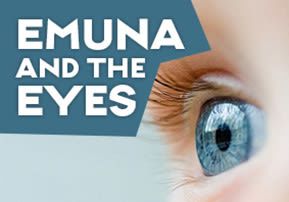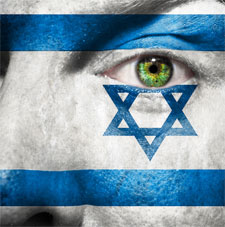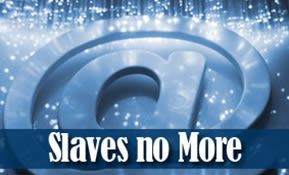
Emuna and the Eyes
Rebbe Natan teaches us an important spiritual principle: one's actions and behavior in the material world trigger equivalent behavior and actions in the spiritual world...

Translated by Rabbi Lazer Brody
Rebbe Natan writes (Likutei Halachot, Masa U’Matan, 4) that emuna is strongly linked with the eyes, for a person with emuna is like someone who “sees Hashem”. In other words, his mind’s eye is always directed at Hashem, and in effect, he is “looking at Hashem.”
King David says (Psalm 25:15), “My eyes are always looking at Hashem.” He exemplifies the spiritual level that Rebbe Natan is speaking about. Rebbe Natan adds that one’s free choice depends on the eyes, for a person is free to look at whatever he wants, whenever he wants. He can look at Hashem or he can look at things that contaminate his mind and soul. The more one guards his eyes from seeing things that he shouldn’t, the more he can focus on Hashem.
Rebbe Natan teaches us a critically important spiritual principle: one’s actions and behavior in the material world trigger equivalent behavior and actions in the spiritual world. For example, the more a person “looks at  Hashem”, the more Hashem “looks at the person”; in other words, the more Hashem exercises His personal Divine providence over that person’s life, guarding over him and fulfilling his every need. On the other hand, the more a person looks away from Hashem and looks at forbidden images, the less he’ll enjoy the benefits of Hashem’s Divine intervention in his life; that’s not very encouraging news, to say the least.
Hashem”, the more Hashem “looks at the person”; in other words, the more Hashem exercises His personal Divine providence over that person’s life, guarding over him and fulfilling his every need. On the other hand, the more a person looks away from Hashem and looks at forbidden images, the less he’ll enjoy the benefits of Hashem’s Divine intervention in his life; that’s not very encouraging news, to say the least.
Is risking Hashem’s constant protection, guidance and assistance worth looking at a lewd image? Only a total moron would be willing to forfeit Hashem’s Divine providence for the imaginary pleasure of looking at the image of a woman. King David therefore pleaded to Hashem and said, “Open my eyes so that I will see the wonders of Your Torah” (Psalm 119:18). King David didn’t want to open his eyes to see anything other than holiness. We all can make the same choice.
Even though seeing is an evidently external act, it is actually a very internal act. Our sight triggers our thoughts and the desires of our heart. Our observance of Torah and mitzvot depend on our sight, as we’ve emphasized in the previous pages. Our innermost fulfillment of Torah and manifestation of emuna is when we look to Hashem and cling to Him.
Jeremiah the Prophet writes in Lamentations 2:19, “Pour your heart out like water in the presence of Hashem.” When we pour our hearts out to Hashem in personal prayer, asking Him to help us desire the right things – holiness, purity and the everlasting truth of Torah – then we merit being in the presence of Hashem.
Without extensive personal prayer, we can’t succeed in guarding our eyes. And, if we don’t guard our eyes, we cannot possibly observe the Ten Commandments, much less the Torah in its entirety. Even the first five of the Ten Commandments – those between man and G-d – cannot be fulfilled without guarding our eyes. The very first commandment, “I Am the Lord your G-d”, is the mitzva of emuna. Emuna entails being happy with one’s lot in life. So, as soon as a person opens his eyes and covets, he either loses his emuna or never succeeds in attaining it in the first place. Also, our sages tell us that one cannot feel the holiness of Sabbath is he doesn’t maintain personal holiness, especially the holiness of his eyes. And, the greatest form of honoring one’s parents is by being an upright son who observes the Torah’s commandments. Any son who fails to guard his eyes is a spiritual insult to his parents, Heaven forbid.
Don’t listen to the clowns who ridicule personal holiness and guarding the eyes. There’s too much at stake. Be courageous like a lion and swift like an eagle to close your eyes whenever they should be closed. It takes a lot of prayer to strengthen us against all the obstacles and difficulties of guarding our eyes. No one said that it’s an easy task – that’s why we must pray so very much, begging Hashem to have mercy on us and help us guard our eyes.







Tell us what you think!
Thank you for your comment!
It will be published after approval by the Editor.